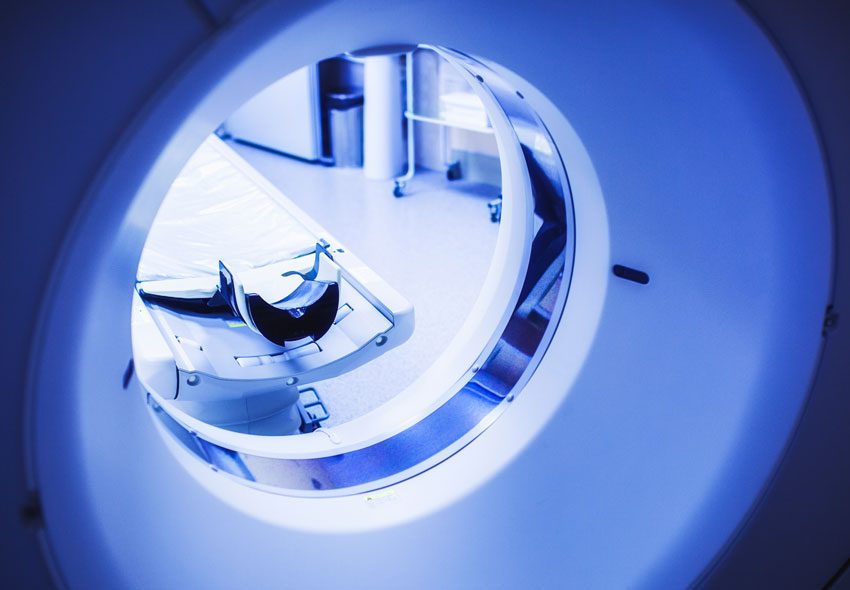What is it?
Nuclear medicine is a specialized area of radiology that is part of our Diagnostic Imaging Departments at St. Margaret’s Health – Spring Valley and St. Margaret’s Health – Peru. It uses very small amounts of radioactive materials/radioactive tracers (or radiopharmaceuticals) to assess bodily functions and structure to diagnose and treat disease. Specially designed cameras allow doctors to track the path of these radioactive tracers that have been introduced to your body and create detailed images of specific organs or tissues being examined. Since these radoopharmaceuticals are taken up by soft tissues and organs, nuclear imaging can provide a better view of them than an X-ray can. Additionally, how much of these radioactive tracers a particular organ or tissue absorbs can also reveal how well it is functioning. This type of imaging produces uniquely detailed information and is most often used to help diagnose and treat abnormalities in earlier phases of a disease.

Spring Valley Diagnostic Imaging Department
Peru Valley Diagnostic Imaging Department

What can it help diagnose?
Through the measurement of how the radioactive tracers act in the body during a nuclear scan, a provider can evaluate and make a diagnosis on a range of conditions, including tumorous growths, hematomas, enlarged organs, certain infections or cysts. Blood circulation can also be looked at.
At St. Margaret's, our Nuclear Medicine is fully computerized and all technologists are registered and state licensed. While this is not a complete list of Nuclear Medicine scans offered at St. Margaret's, here are some types our Diagnostic Imaging Department performs:
- Renal Scans: This form of scan is used to look for any abnormalities of the kidneys, including any problems with functioning or renal blood flow.
- Thyroid Scans: These scans are used to assess thyroid functioning or to get a better image of a thyroid nodule or mass.
- Bone Scans: These are performed to identify any degenerative and/or arthritic changes to the joints, to find bone diseases and tumors and/or to examine the source of bone pain or inflammation.
- Gallium Scans: This type of scan helps diagnose infectious and/or inflammatory diseases, tumors and abscesses.
- Heart Scans: A heart scan will show any abnormal blood flow to the heart, assess the level of damage to heart muscle after a heart attack and/or to look at heart functioning.
- Ceretec Labeled White Blood Cell Scans: This type of nuclear medicine scan that looks at tissues and organs for the presence of infection or abscess.
- Gastric Emptying Study (GES): A GES is used to observe the amount of time is takes food to move through a patient’s stomach.
Gastrointestinal Bleed Study (GIBS): A GIBS is performed to assess a patient who has a suspected bleed somewhere along the gastrointestinal tract.
- Lung Scan: Used to help diagnose problems with the lungs, this test uses nuclear medicine to provide an image of a patient’s lungsA parathyroid MIBI scan is used in nuclear medicine to look at possible problems involving the parathyroid gland(s). The parathyroids are four small hormone glands lying close to or embedded in the back surface of the thyroid gland, in the front of the neck.
- Parathyroid Scan: Utilizing a safe, radioactive liquid that is injected into the body, this scans tests for an overactive (hyperactive) parathyroid. Healthy parathyroids will not absorb the radioactive liquid. Images of a overactive gland that is making too much hormone can then be analyzed.
- Lymphoscintigraphy: This test is used to evaluate the lymphatic system to locate the first few, or sentinel lymph nodes, to contain lymph fluid from a cancer/tumor. These lymph nodes can then be removed and checked for tumor cells. It is also used to help diagnose certain diseases, such as lymphoma or lymphedema.
- Gastric Reflux Study: Radioactive tracers are used to evaluate whether the patient has gastro-esophageal reflux.
- Choleycystogram: This test is used to examine a patient’s gallbladder.
- and More
